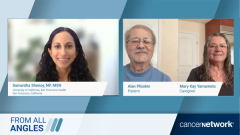
Alan's Treatment Course and Quality-of-Life Goals
Panelists discuss how expectations for treatment outcomes can become more positive over time through experience with multiple therapies, staying informed about clinical trials and new treatments, and focusing on quality of life as a primary treatment goal alongside disease control.
Episodes in this series

Alan Plisskin’s treatment journey included 5 prior lines of therapy before receiving talquetamab, including chimeric antigen receptor T-cell therapy with idecabtagene vicleucel and an autologous stem cell transplant. Despite experiencing a rare vocal cord freezing reaction to Velcade, which affects only 0.125% of patients, Plisskin maintained a positive outlook as successive treatments proved successful. He stayed informed about clinical trials, new drugs, and potential adverse effects, demonstrating active patient engagement in treatment decisions.
Both Plisskin and Mary Kay Yamamoto report increasingly positive expectations over time, attributed to growing familiarity with the disease, reduced fear through knowledge acquisition, and significant treatment advances over the 7 years since diagnosis. Yamamoto emphasizes the importance of being armed with knowledge rather than avoiding information, noting substantial improvements in treatment options and physician considerations for therapy selection since her husband’s initial diagnosis.
When considering talquetamab treatment, quality of life emerged as Plisskin’s primary concern alongside disease control. With limited options remaining—either talquetamab or clinical trials— Samantha Shenoy, NP, MSNrecommended talquetamab based on favorable results with fewer adverse effects compared with other approved bispecific antibodies. Plisskin’s treatment decision-making process illustrates how patients with heavily pretreated multiple myeloma must balance efficacy expectations with quality-of-life considerations, emphasizing the importance of maintaining normal daily activities while managing their cancer.
Newsletter
Stay up to date on recent advances in the multidisciplinary approach to cancer.




































